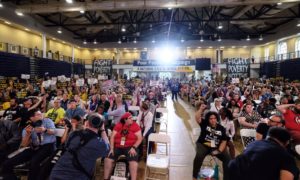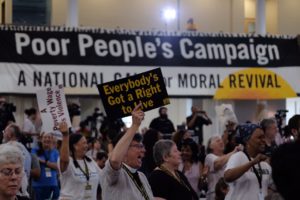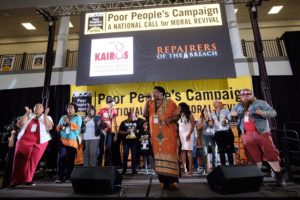Candidates Discuss Poverty, Systemic Racism at Poor People’s Campaign Presidential Forum
Nine Democratic presidential candidates shared their visions to alleviate poverty and systemic racism – and how they would make these issues a priority in the 2020 campaign – at Monday’s Poor People’s Campaign presidential forum.
Led by co-chairs Revs. Dr. William Barber II and Dr. Liz Theoharis, the Poor People’s Campaign: A National Call for Moral Revival, is an inclusive “moral fusion movement” in over 40 states that works to address the related injustices of systemic racism, poverty, ecological devastation, militarism, and what organizers view as the nation’s distorted morality.
Monday’s event was the only presidential candidate forum exclusively focused on poverty and systemic racism, helping to shine a light on the 140 million poor and low-income Americans who are often ignored in public debate.

Photo Credit: Poor People’s Campaign
The nine candidates who spoke at the event were Sen. Michael Bennet (D-CO); former Vice President Joe Biden; Sen. Kamala Harris (D-CA); Miramar, Fla. Mayor Wayne Messam; Sen. Bernie Sanders (D-VT); Rep. Eric Swalwell (CA-15); Sen. Elizabeth Warren (D-MA); author and activist Marianne Williamson; and entrepreneur Andrew Yang.
Organizers said they sent invitations to President Donald Trump and the Republican National Committee but received no response.
Candidates were given four minutes to share an opening statement with the audience, followed by questions from Barber and Theoharis, co-moderator Joy Reid, and audience members directly affected by the issues the campaign engages with.
Questions from the forum were framed around the release of the “Moral Budget: Everybody Has A Right to Live” report, which outlines how federal budget shifts would make funding available to better support poor and low-income Americans. Barber and Theoharis also asked candidates about how they would mobilize and spend time in Southern states, build interracial coalitions, and advocate for more poverty-focused debates.
Candidates across the board asserted that they would make poverty a priority in this election and would ask major news networks to host debates focused on the intersection of poverty, systemic racism, ecological devastation, and militarism.
“Many people are giving up on politics because they never hear the issues, whether it’s systemic racism, whether it’s voter suppression…they don’t hear those issues being discussed,” said Sanders.
“My whole career, I’ve talked about poverty,” Biden said, expressing support for a poverty-focused debate. “That’s why I got involved. That’s why I got started in the first place.”
Candidates also spoke to the importance of creating a coalition of Americans that spans across racial and party lines, lamenting the current division in American politics.
“We need to win over Americans from every point in the political spectrum,” Yang said. “I will have an honest conversation with anyone anywhere. We need to make it so Democrat is not a dirty word in certain parts of the country.”
Bennet noted that many people in the South are not fairly represented, and change will only occur if a broad coalition is built across the country.
“We need to build a constituency for a change,” he said.

Photo Credit: Poor People’s Campaign
When asked what specific actions they would take to mitigate poverty, candidates’ responses ranged from tax policies to policies aimed at eliminating voter suppression.
Warren spoke about her plan to implement a wealth tax on those with over $50 million in order to help raise wages for pre-school teachers, cancel student loan debt, and address the opioid crisis, among other national needs.
“You start to talk about budgets, and people glaze over… [But] tell me where you spend your money, and I’ll tell you where your values are,” she said.
Responding to a question from the audience on the preservation of tribal lands, Yang shared his belief that GDP should be measured in terms of human health and success, not money.
“When you talk about the poisoning of your [Native] land, the problem is we’re measuring economic progress in GDP, and then people are obstacles,” he said.
During his time on stage, Sanders reasserted his view that those in prison should have the right to vote.
“In my view, the solution to this issue is not complicated. If you are 18 years of age in America, and you are a citizen of this country, you have the right to vote, end of discussion,” he said.
Audience questions covered a wide range of issues including criminal justice reform, veterans, and immigration.
Harris spoke about her opposition to private prisons. “The business model is for certain human beings to make money off the incarceration of other human beings,” she said.
Overall, candidates described a need to mobilize as a collective group to stand up to the power of the wealthy in order to create real change for the 140 million people living in poverty.
“Right now our democracy revolves around who has the money,” Yang said. “If we put money in our hands as shareholders of this democracy, we can begin retaking our democracy.”
Monday’s presidential forum opened the three-day Poor People’s Campaign Moral Action Congress, which includes organizing trainings for low-income communities and a hearing before the House Budget Committee.
You can view all the candidates’ statements and the Q&A from the forum here.

Photo Credit: Poor People’s Campaign
